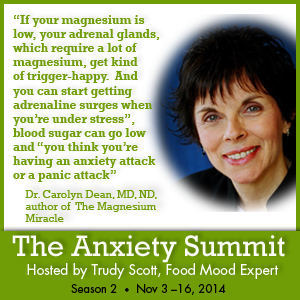Dr. Carolyn Dean, MD, ND, author of The Magnesium Miracle was interviewed by host of the Anxiety Summit, Trudy Scott, Food Mood Expert and Nutritionist, author of The Antianxiety Food Solution.
Take magnesium and melt your anxiety away
- how important is magnesium: enzymatic processes, mitochondria, heart health, anxiety
- how important is magnesium compared to calcium; and the vitamin D connection
- the medication fluoride concern and magnesium impact
- the symptoms of magnesium deficiency
- why we are deficient in magnesium
- dietary sources of magnesium and why diet is often not enough
- how to test your magnesium level
Here are some snippets from our interview:
If your magnesium is low, your adrenal glands, which require a lot of magnesium, get kind of trigger-happy. And you can start getting adrenaline surges when you’re under stress, blood sugar can go low and you think you’re having an anxiety attack or a panic attack.
Now, your cholesterol depends on a magnesium enzyme to balance cholesterol. If you have too much, it brings it down; if you have too little, it brings it up. It’s done through the mechanism of magnesium. But the statin drugs kill that particular enzyme! And, as well, they cause more magnesium deficiency because many of the statin drugs actually have a fluoride molecule attached, and that fluoride molecule will bind up more magnesium.
Here is one of the 2014 studies we mentioned: Effect of oral magnesium supplementation on physical performance in healthy elderly women involved in a weekly exercise program: a randomized controlled trial
Daily magnesium oxide supplementation for 12 wk seems to improve physical performance in healthy elderly women. These findings suggest a role for magnesium supplementation in preventing or delaying the age-related decline in physical performance.
Here’s the blog post: When magnesium makes me worse It also has information about magnesium RBC testing with RequestaTest.com and fluoride in medications.
This is the last study Carolyn mentioned – Magnesium deficiency induces anxiety and HPA axis dysregulation: modulation by therapeutic drug treatment.
Overall, the present findings demonstrate the robustness and validity of the Mg(2+) deficiency model as a mouse model of enhanced anxiety, showing sensitivity to treatment with anxiolytics and antidepressants. It is further suggested that dysregulations in the HPA axis may contribute to the hyper-emotionality in response to dietary induced hypomagnesaemia.
Carolyn’s gift 4 Weeks of 2 Year Wellness Program PLUS Invisible Minerals
If you are not already registered for the Anxiety Summit you can get live access to the speakers of the day here www.theAnxietySummit.com
